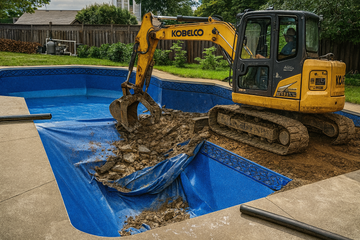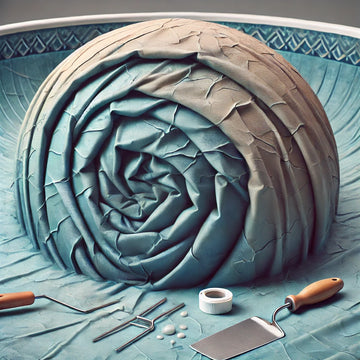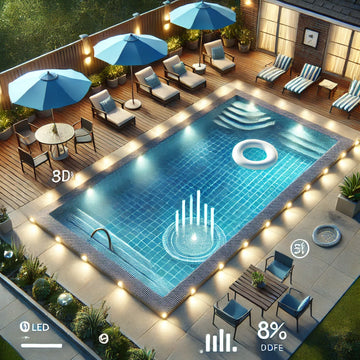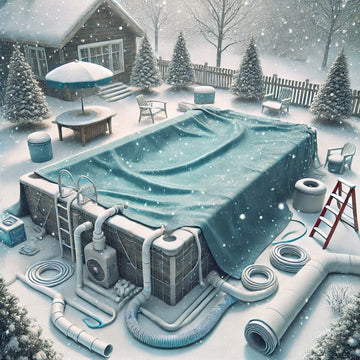The pool filter has an important job. It filters out dirt and bacteria, ensuring that your pool is clean and safe to use. This important tool can’t do its job correctly if it is broken. That’s why pool owners should check their filter regularly to ensure that it still works.
Unfortunately, pool filters can develop problems pretty easily. You might notice that your pool filter’s pressure seems off, or that it isn’t giving your pool the deep cleaning you want it to.
Have no fear – our guide to pool filter problems will help you figure out what needs to be done to get your pool filter back on track
How Does a Pool Filter Actually Work?
The pool filter’s purpose is to remove the bad stuff – in this case, dirt and bacteria – and protect the good stuff, meaning clean water.
Specifically, this process begins when the pool pump pulls water from the skimmer on the pool’s floor and walls. The water is brought through the filter, which removes debris. The freshly cleaned water then goes through the plumbing to the heater and/or the salt chlorine generator, before being sent back into the pool.
For this process to work, of course, the pool filter must be functioning correctly. But what if it isn’t? Read below to learn about some of the most common pool filter problems.
Help! My Pool Filter…
Has High Pressure
If your pool’s filter pressure randomly increases, you should check on it right away, as high levels of pressure are dangerous. There are a few reasons that you might end up with this problem: your pool could simply be dirty, though there may also be something in the filter clogging it up. You might also have a closed return valve. Considering washing your filter or cleaning your cartridges.
Has Low Pressure
Sometimes, your pool is supposed to have a low filter pressure – like when the pump is turned off, or the valve is in the process of recirculating or draining to waste. What if the pump is running and there’s still no pressure?
Check out the gauge dial to see if it is held in place properly. If water appears to be moving through the filter properly, you might have a failing gauge – or a clog within the air bleeder assembly that it screws into.
Has Rapid Pressure Increases
It’s normal for pool filter pressure to rise and fall. If the pressure has rapid increases, you should be concerned. It’s likely that your filter is clogged with dirt or another substance. Make sure your filter is clean and installed properly.
Leaks Water Near the Clamp
Certain types of filters can end up with format-specific problems. Clamshell filters are designed to form a seal with their two parts – however, water may leak, indicating the seal is broken.
If this happens, you’ll need to take your filter apart. Shut it off and remove the filter clamp band and the ‘filter o-ring.’ Clean these components and the tank itself before putting it back. You may choose to lubricate the o-ring with pool lube to ensure it forms a seal more securely next time.
Pushes Dirt Back Into the Pool
It’s normal for some dirt to get pushed back into the pool, but ideally, you wouldn’t want too much dirt to fall through the cracks – after all, that’s what a filter is there to prevent.
Make sure that all components of your filter are installed properly. If you use a sand filter, remember to use a filter cleaner as frequently as possible. If you use a DE filter, make sure you replenish your DE powder if necessary.
Won’t Get Rid of Cloudy Water
If your pool water is looking murky, the filter might not be the problem. Make sure your pool’s chemicals are balanced properly. Otherwise, make sure your pool’s pump and filter are installed properly and don’t have any broken components.
When Should I Talk to a Professional?
If you’ve ensured that your filter and its components are fitted properly, and that your filter is cleaned regularly, but you still face problems, you may consider contacting a professional. It’s possible that your filter isn’t matched well for your pool or its other components, or that it has been installed properly – or, you’ll need a new one.
Pool care professionals are trained to diagnose pool problems and determine what steps need to be taken. Plus, by using the services of a professional, you limit the risk of accidentally making the wrong call.
The Takeaway
Your pool filter is supposed to keep your water as fresh and clean as possible. If your filter is failing to do that, don’t ignore the problem – try to figure out what needs to be done to restore your pool water to its health.




